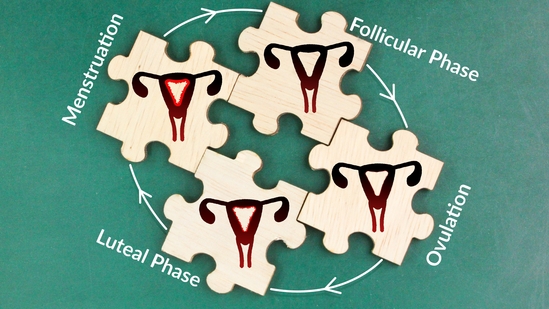Follicular phase diet: What to eat for optimal health
September is PCOS Awareness Month, making it the perfect time to discuss how diet can impact during the follicular phase of the menstrual cycle.
The menstrual cycle is a complex, regulated process that occurs in the female reproductive system and typically takes around 28 days, although it can vary from person to person. It is divided into four main phases: Phase-1: Menstruation (Days 1-5), Phase-2: Follicular Phase (Days 1-13), phase-3: Ovulation (Day 14) and Phase-4: Luteal Phase (Days 15-28).

The follicular phase is the first half of the menstrual cycle, leading up to ovulation. During this phase, estrogen levels rise, preparing the body for potential pregnancy. A balanced diet can help support hormonal health and overall well-being during this time. Here are some dietary recommendations for the follicular phase:
Nutrient-Rich Foods: Focus on whole, nutrient-dense foods that provide essential vitamins and minerals. Include plenty of fruits, vegetables, lean proteins, whole grains, and healthy fats in your diet.
Folate: Folate is important for reproductive health. Include folate-rich foods like leafy greens, lentils, beans, and fortified cereals in your diet.
Iron: Iron is crucial to prevent anemia, which can affect menstruation. Good sources of iron include lean meats, poultry, fish, beans, lentils, spinach, and fortified cereals.
Fiber: Fiber helps regulate blood sugar levels and supports digestive health. Whole grains, legumes, fruits, and vegetables are excellent sources of fiber.
Healthy Fats: Omega-3 fatty acids, found in fatty fish (e.g., salmon), flaxseeds, and walnuts, can help reduce inflammation and support hormonal balance.
Protein: Include lean sources of protein like chicken, turkey, fish, tofu, and beans to support muscle health and hormone production.
Antioxidants: Antioxidant-rich foods like berries, citrus fruits, and leafy greens can help protect your cells from oxidative stress and inflammation.
Calcium and Vitamin D: These nutrients are essential for bone health. Include dairy products, fortified plant-based milk, leafy greens, and small fish with bones in your diet.
Hydration: Staying well-hydrated is important for overall health. Drink plenty of water and consider herbal teas or coconut water for added variety.
Limit Processed Foods: Minimize your intake of processed foods, sugary snacks, and excessive caffeine, as these can disrupt hormonal balance and energy levels.
Consider Herbal Teas: Some herbal teas like raspberry leaf tea and nettle tea are believed to support reproductive health. Consult with a healthcare professional before adding herbal remedies to your diet.
Adequate Calories: Ensure you're consuming enough calories to support your energy needs. Extreme calorie restriction can disrupt hormonal balance.
Supplements: Include zinc, iodine & selenium and Vitamin B6 & probiotics.
It's important to remember that individual dietary needs can vary, and some people may have specific dietary restrictions or conditions that require personalized guidance. Consulting with a healthcare provider or a registered dietitian can help you create a tailored nutrition plan for your unique needs during the follicular phase or at any other stage of your menstrual cycle.






